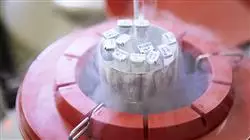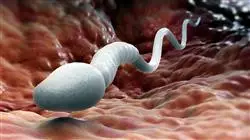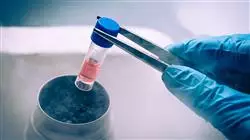University certificate
The world's largest faculty of medicine”
Description
A high-level educational program created to improve the training of professionals in the field of Assisted Reproduction, including medical, laboratory and complementary areas"

Reproductive Medicine is a specialty that has been advancing by leaps and bounds in recent years thanks, fundamentally, to the improvement in laboratory techniques and the development of new genetic diagnostic techniques, which, on many occasions, can lead to the failure of previous reproductive treatments, offering new alternatives.
Physicians in this field should stay up to date on the area of diagnosis and treatment, but should also deepen their knowledge of the work that takes place in the laboratory. This helps to be able to transmit the necessary information to patients, especially if treatments aren’t successful. Likewise, within the laboratory, there must be an understanding of the work of the practice, the types of stimulation and the different factors that can affect the outcome of the treatments. The teamwork of the Human Reproduction Unit is what will allow for more personalized treatments.
The objective of this professional master’s degree is to give a global vision to all professionals that allows them to keep up to date in the work of the entire Assisted Reproduction Unit.
With a duration of 12 months, this program is composed of 10 modules and more than 50 units, where important aspects will be addressed such as the advances in the study of the female factor, especially at the level of the endometrial factor, in-depth study of the male factor, applications of genetic techniques in improving results, improvements in the laboratory through time-lapse systems, culture media and quality control systems. All this has been designed by a team of leading specialists in Reproductive Medicine in each one of the aspects dealt with throughout the course.
A unique specialization program that will enable you to acquire superior training for development in this field"
This professional master’s degree in Update on Assisted Reproduction contains the most complete and up-to-date scientific program on the market. Its most notable features are:
- The latest technology in online teaching software
- A highly visual teaching system, supported by graphic and schematic contents that are easy to assimilate and understand
- Practical cases presented by practising experts
- State-of-the-art interactive video systems
- Teaching supported by telepractice
- Continuous updating and recycling systems
- Autonomous learning: full compatibility with other occupations
- Practical exercises for self-evaluation and learning verification
- Support groups and educational synergies: questions to the expert, debate and knowledge forums
- Communication with the teacher and individual reflection work
- Content that is accessible from any fixed or portable device with an Internet connection
- Supplementary documentation databases are permanently available, even after the program
The teachers of this professional master’s degree have been selected based on two criteria: the excellence of their medical practice in the field of the creation, promotion and maintenance of the bariatric units, and their proven educational capacity: To offer you the high-quality program that you need”
Our teaching staff is composed of medical professionals, practising specialists. This way, we ensure that we deliver the educational refresher course we are aiming for. A multidisciplinary team of qualified and experienced professionals in different fields, who will develop the theoretical knowledge efficiently, but, above all, will provide the program with the practical knowledge derived from their own experience: one of the differential qualities of this professional master’s degree
This mastery of the subject is complemented by the effectiveness of the methodology used in the design of this course. Developed by a multidisciplinary team of e-Learning experts, it integrates the latest advances in educational technology. In this way, you will be able to study with a range of comfortable and versatile multimedia tools that will give you the operability you need for your training.
The design of this program is based on Problem-Based Learning: an approach that conceives learning as a highly practical process. To achieve this remotely, we will use telepractice learning: with the help of an innovative interactive video system, and learning from an expert, you will be able to acquire the knowledge as if you were actually dealing with the scenario you are learning about. A concept that will allow you to integrate and fix learning in a more realistic and permanent way.
With a methodological design based on proven teaching techniques, this professional master’s degree will take you through different teaching approaches to allow you to learn in a dynamic and effective way"

Identify new assisted reproduction techniques and apply them in your medical treatments, providing a higher success rate"
Objectives
Given this study topic's medical relevance, TECH has made every effort to ensure that this program provides a thorough and accurate update on the most important issues for all specialists in Assisted Reproduction. Therefore, all the content, exercises and supplementary material are focused on achieving a comprehensive and effective update, with which practitioners will be modernizing all their knowledge even before completing their own qualification.

Our goal is yours: to provide you with the best online training in Update on Assisted Reproduction on the educational market. A highly qualified step, from the hands of the best professionals in this specialty"
General Objectives
- Perform basic clinical examinations, and request and interpret complementary test results
- Know the indications and surgical techniques that could improve the reproductive results of our patients. Uterine morphology disorders (congenital or acquired) Endometriosis Tubal surgery
- Know the techniques used in the Andrology, IVF and cryobiology laboratories. Diagnostic techniques and sperm selection techniques: Oocyte Evaluation. Embryonic Development
- Describe the types of genetic embryonic studies that are available, know their possible indications and be able to interpret the results
- Know the main scientific and patient societies in the field of Reproductive Medicine
Specific Objectives
Module 1. Introduction. Anatomy. Physiology. Cellular Cycle
- Study the developments and advances throughout the history of Reproductive Medicine
- Examine the aspects related to female and male anatomy, in addition to those related to gametogenesis and oocyte fertilization by the spermatozoon
- Delve into the anatomy and embryology related to embryonic genesis and embryo implantation
Module 2. Gamete Interaction Fertilization Embryonic Development
- Differentiate the different reproductive techniques: ovulation stimulation, artificial insemination and In Vitro Fertilization with or without sperm microinjection
- Detail the indication of the different reproductive techniques
- Understand the possibility of using reproductive techniques with donor gametes
- Know the different adjuvant treatments that could be used in patients diagnosed with low ovarian reserve
- Manage the different types of ovulation induction according to the patient's profile
- Know the usual artificial insemination and vitro fertilization cycles
Module 3. Study of the Female Factor: Role of Surgery in Reproduction
- Study the possible relationship with tubal factor sterility and infertility
- Deepen in the histological, immunological and microbiological endometrial changes and in the current techniques for their evaluation
- Basic study of ovarian reserve
- Distinguish the factors that can affect female reproductive capacity at the level of decreased ovarian reserve
- Understand tubal patency assessment techniques
Module 4. Andrology Laboratory
- In-depth knowledge of the basic study at the male level
- Interpret normal values of a semen analysis
- Know the factors that may affect male reproductive capacity in terms of sperm quality, motility, morphology, aneuploidy or sperm DNA fragmentation
- Deepen the current specific studies for the male factor, as well as advanced techniques
- Develop the indications for testicular biopsy and its procedure
Module 5. Reproductive Treatments: Medication. Stimulation Protocols
- Manage the different drugs used in ovulation stimulation
- Know the different stimulation protocols according to the patient's characteristics
- Develop IVF/ICSI techniques (micromanipulation) from the beginning: SUZI, PZD, ROSI, ELSI, IMSI, PICSI, assisted hatching
- Explore culture media composition and requirements as a function of embryonic developmental stage
- Study embryo development and specific classification of embryo quality according to stages
- Delve into time-lapse technology and the different kinetic events affecting embryo division
- Study the automatic algorithms presented by each time-lapse technology and relate them to the reproductive results
- Develop additional lab techniques that allow possible improvement in embryo implantation (collapse, hatching)
Module 6. Micromanipulation Techniques
- Understand the need to establish general and specific quality indicators for each laboratory in order to maintain the best conditions in the laboratory
- Study the impact of fibroids on fertility
- Analyze the possible surgical indications in patients with fibroids and infertility
- Delve deeper into the impact of uterine malformations on fertility
- Analyze the possible surgical indications in patients with surgical malformations and infertility Metroplasties. Septoplasties
- Understand the role of tubal surgery in improving natural fertility
- Develop the surgical option of uterine transplantation, its indications and technique
Module 7. Gamete and Embryo Cryopreservation
- Study the "freeze all” indications
- Know and manage the possible complications derived from assisted reproduction treatments
- Analyze the medication used for the endometrial preparation of substituted embryo cryotransfer cycles
- Update the different luteal phase support protocols
- Develop gamete handling in the laboratory
- Know the embryo biopsy techniques according to the stage of embryo division
- Know the embryo biopsy techniques according to the technology used and the existing means in each laboratory
- Analyze the indications for fertility preservation in the male
- Study the techniques used in sperm cryopreservation and their efficiency
- Deepen the indications for fertility preservation in women
- Know the techniques used in oocyte cryopreservation and their efficiency
- Know the techniques used in ovarian tissue cryopreservation and their efficiency
Module 8. Fertility Preservation
- Study the European standards to establish the minimum criteria required in Reproduction Units (ISO/UNE)
- Study in depth the definitions and indications for the study of the couple with repeated miscarriages or implantation failures
- Develop the level of evidence for each of the requested tests
- Gain knowledge the different treatment options
- Study the impact of endometriosis on fertility
- Analyze the possible surgical indications in patients with endometriosis and infertility
- Know the impact of adenomyosis on fertility
- Develop possible surgical indications in patients with adenomyosis and infertility
- Understand the impact of the hydrosalpinx on fertility and its surgical indication prior to In Vitro Fertilization
Module 9. Genetics in Reproduction
- Study the basic concepts of genetics
- Develop the basic concepts of reproductive genetics
- Analyze the concept of "epigenetics" and its influence on reproduction
- Know the different genetic diagnostic techniques, existing platforms and application of each of them according to the diagnostic objective
- Analyze the indications in reproductive medicine for diagnosis and screening of aneuploidy
- Interpret the results of genetic studies
- Understand the need for genetic counseling
- Knowledge of embryo biopsy techniques
- Study the results of the pre-implantation genetic diagnosis and aneuploidy screening program
Module 10. Legislation. Quality. Research and Future Techniques
- Develop new techniques in genetic diagnosis (non-invasive tests, mitochondrial transfer) and their possible future applications

Reach your goals thanks to the best professionals in the field of Update on Assisted Reproduction"
Professional Master's Degree in Assisted Reproduction Update
The advance of technology has allowed the development of effective treatments to help in the evolutionary procreation of humans; thanks to this progress comes assisted reproduction, a procedure used to treat infertility and help solve these problems. If you are a professional belonging to the medical sector and wish to specialize in a discipline in constant evolution, now is the time to do it; at TECH we have academic excellence and we offer you a Professional Master's Degree in Assisted Reproduction Update, a highly qualified program that will allow you to acquire new knowledge and update your knowledge status to take your career to the next level. Specialize in the anatomy and physiology of the cell cycle and learn about gamete interaction, fertilization and embryonic development. You will be able to incorporate new competencies to your profile while you train in the largest Medical School, take this Postgraduate Certificate designed with the best online teaching methodologies and potentiate all your intellect.
Study a Professional Master's Degree in Assisted Reproduction
At TECH we have the most updated program in the market, with which you will be an expert in the subject and reinforce your knowledge about diagnostic and laboratory lines, consultation work and types of stimulation in treatments, with the aim of offering the best services and the highest level procedures in artificial fertilization. With this program you will be a specialist equipped with the most updated tools in the industry; take this Postgraduate Certificate that has a duration of 1,500 hours and more than 50 topics where you can reinforce your knowledge in genetic techniques, culture media, quality control systems and endometrial factor.
Update your knowledge in assisted reproduction
All professionals in the medical sector who wish to incorporate new skills to their professional career can take this Postgraduate Certificate completely online. At TECH Technological University we have unique methodologies that will allow you to develop this program with ease and acquire the best tools. This Professional Master's Degree is designed by a team of specialists in reproductive medicine, so you will have the highest educational quality and you will be able to perfect your skills in this field.







